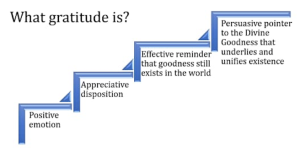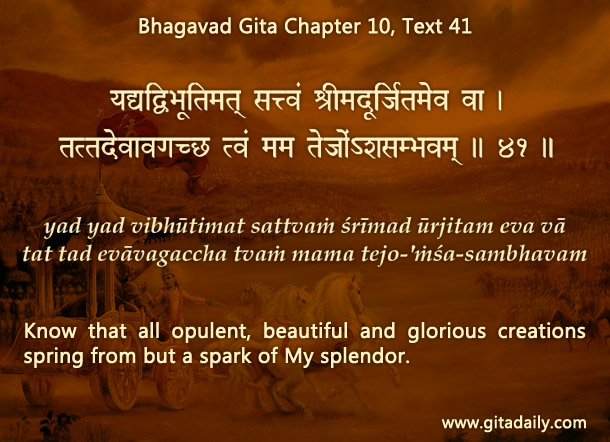
Gratitude can be valued and sought at four distinct levels of increasing depth
A positive emotion: Focusing on the good things in our life infuses us with positive emotions such as contentment and cheerfulness.
An appreciative disposition: Going beyond an occasional or circumstantial positive emotion, we seek a consistent disposition that looks toward the good in every situation.
An effective reminder: Going beyond merely changing our inner disposition, we base this disposition on curated perception of outer reality. We all need reminders that goodness still exists in the world. Why? Because the daily news — and especially the breaking news — usually highlights deceit, distress and destruction in the world. Moreover, though we all sometimes experience goodness through others’ acts of kindness, sometimes unsolicited kindness, that others have done to us, our mind gravitates toward the bad things that have happened to us. Remembering others’s goodness through gratitude can protect us from toxic cynicism.
A persuasive pointer: Reminders of the goodness in the world are great, but they become most potent when they point us to the greatest being, Krishna, who sources and sustains all of existence. The Bhagavad-gita (10.41) states that everything attractive manifests a spark of Krishna’s all-attractiveness. Applying this insight, we can infer that because good things in the world are attractive, such goodness manifests a drop of the oceanic goodness of God. Thus, if a family member or colleague or even stranger is kind to us in our moment of weakness, we see God’s kindness acting through them. This vision nourishes our devotion and powers us toward the One who alone can provide us enduring safety, meaning and fulfillment.
One-sentence summary:
Gratitude is not just a positive emotion or an appreciative disposition; it is also an effective reminder that goodness still exists in the world and a persuasive pointer to the goodness of the Divine who underlies and unifies existence.
Think it over:
- How can gratitude be an effective reminder? Of what?
- How can gratitude be a persuasive pointer? Toward what?
- How can you develop these two deeper levels of gratitude?
***
10.41: Know that all opulent, beautiful and glorious creations spring from but a spark of My splendor.
To know more about this verse, please click on the image


Leave A Comment